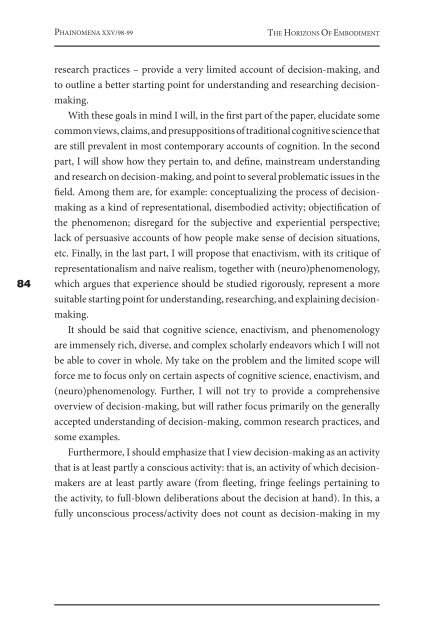phainomena
PHAINOMENA-98-99_e-verzija
PHAINOMENA-98-99_e-verzija
Create successful ePaper yourself
Turn your PDF publications into a flip-book with our unique Google optimized e-Paper software.
PHAINOMENA XXV/98-99<br />
THE HORIZONS OF EMBODIMENT<br />
84<br />
research practices – provide a very limited account of decision-making, and<br />
to outline a better starting point for understanding and researching decisionmaking.<br />
With these goals in mind I will, in the first part of the paper, elucidate some<br />
common views, claims, and presuppositions of traditional cognitive science that<br />
are still prevalent in most contemporary accounts of cognition. In the second<br />
part, I will show how they pertain to, and define, mainstream understanding<br />
and research on decision-making, and point to several problematic issues in the<br />
field. Among them are, for example: conceptualizing the process of decisionmaking<br />
as a kind of representational, disembodied activity; objectification of<br />
the phenomenon; disregard for the subjective and experiential perspective;<br />
lack of persuasive accounts of how people make sense of decision situations,<br />
etc. Finally, in the last part, I will propose that enactivism, with its critique of<br />
representationalism and naive realism, together with (neuro)phenomenology,<br />
which argues that experience should be studied rigorously, represent a more<br />
suitable starting point for understanding, researching, and explaining decisionmaking.<br />
It should be said that cognitive science, enactivism, and phenomenology<br />
are immensely rich, diverse, and complex scholarly endeavors which I will not<br />
be able to cover in whole. My take on the problem and the limited scope will<br />
force me to focus only on certain aspects of cognitive science, enactivism, and<br />
(neuro)phenomenology. Further, I will not try to provide a comprehensive<br />
overview of decision-making, but will rather focus primarily on the generally<br />
accepted understanding of decision-making, common research practices, and<br />
some examples.<br />
Furthermore, I should emphasize that I view decision-making as an activity<br />
that is at least partly a conscious activity: that is, an activity of which decisionmakers<br />
are at least partly aware (from fleeting, fringe feelings pertaining to<br />
the activity, to full-blown deliberations about the decision at hand). In this, a<br />
fully unconscious process/activity does not count as decision-making in my


